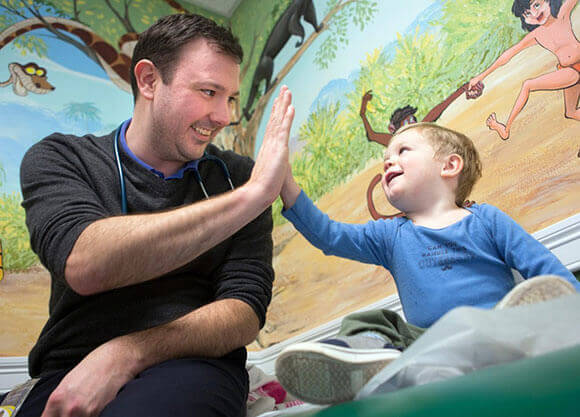
Medical school awarded $750,000 grant for family medicine residency program in rural Maine
August 27, 2019

August 27, 2019

The grant will fund the development of the school’s first Family Medicine Residency program. The residency program will be based at Northern Maine Medical Center, a 50-bed hospital serving approximately 12,000 people in a 25-mile radius, located in Fort Kent, Maine, a town with a population of 4,000 in Aroostook County, the state’s northernmost county; and Northern Light AR Gould Hospital, an acute-care hospital in Presque Isle, Maine.
The grants, issued through HHS’ Health Resources and Services Administration, support training medical residents to combat the severe shortage of physicians practicing in rural America. Quinnipiac was one of 27 organizations across 21 states to receive a portion of $20 million over a three-year period to develop new rural residency programs in primary care or psychiatry while achieving accreditation though the Accreditation Council for Graduate Medical Education.
In announcing the grants, Health and Human Services Secretary Alex Azar said, “Supporting the training of health care providers in rural areas through grants like these is a key way to help expand rural access to care, and is part of an overall effort to support rural health care in a sustainable, innovative and flexible way.”
Bruce Koeppen, dean of the School of Medicine, said, “Building a family medicine residency program in rural Maine is an essential component of the school’s strategic plan and its commitment to training the primary care workforce this country so desperately needs, especially for those living in rural communities.” He added that the grant is crucial to facilitating the development of the residency program.”
Dr. Traci Marquis-Eydman, director of the Longitudinal Integrated Clerkship and Rural Medicine elective at Quinnipiac/NMMC, grew up in Aroostook County and watched her parents struggle to find and keep a primary care physician.
“On behalf of the Netter School of Medicine and Quinnipiac University, we are thrilled and honored to be one of the recipients of the HRSA Rural Residency Planning grant awards,” Marquis-Eydman said. “We see this as an incredible opportunity to continue working alongside our partners at Northern Maine Medical Center to educate future physicians dedicated to rural practice. On a personal level, I am also delighted for the people in my community in northern Maine.”
According to Marquis-Eydman, the acute shortage of physicians and the lack of access to care creates health disparities for people in rural America, who are generally sicker and poorer than urban residents and more likely to die from heart disease, cancer, unintentional injury, chronic lower respiratory disease and stroke. The American Academy of Family Physicians found that one of the primary factors that lead physicians to choose a rural practice is training that includes a rural rotation.
The Family Residency program is a partnership among the Netter School at Quinnipiac University, St. Vincent’s Medical Center in Bridgeport, Connecticut NMMC and Northern Light AR Gould Hospital.
The Netter School plans to recruit four residents each academic year for the program, which expands on its new Longitudinal Integrated Clerkship, a full-immersion, rural clerkship for third-year medical students that began this year in Fort Kent.
“This HRSA grant will support Quinnipiac’s efforts to advance primary care and improve health care access for underserved populations,” said Dr. Richard S. Stahl, senior associate dean for strategic relationships at the medical school. “The resources that are provided will create additional medical education capacity and infrastructure for us and our valued clinical partners in northern Maine and Connecticut.”
Peter Sirois, president and CEO of the NMMC, said, “Having a residency program at Northern Maine Medical Center is extremely exciting. We have an outstanding medical staff who love to teach and share their knowledge. The prospect of having residents working and training alongside our medical staff is a dream come true for our hospital and the communities we serve. In the end, our hope is that these residents will develop a passion for rural medicine and make NMMC their preferred place to work.”
Quinnipiac Today is your source for what's happening throughout #BobcatNation. Sign up for our weekly email newsletter to be among the first to know about news, events and members of our Bobcat family who are making a positive difference in our world.
Sign Up Now